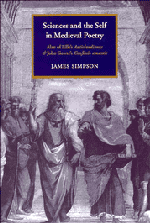 Sciences and the Self in Medieval Poetry
Sciences and the Self in Medieval Poetry Book contents
- Frontmatter
- Contents
- Acknowledgements
- List of abbreviations
- 1 Introduction
- 2 The outer form of the Anticlaudianus
- 3 A preposterous interpretation of the Anticlaudianus
- 4 Alan's philosopher–king
- 5 Ovidian disunity in Gower's Confessio amantis
- 6 Genius's psychological information in Book III
- 7 The primacy of politics in the Confessio amantis
- 8 Poetics
- 9 Conclusion: varieties of humanist politics
- Works cited
- Index
- CAMBRIDGE STUDIES IN MEDIEVAL LITERATURE
9 - Conclusion: varieties of humanist politics
Published online by Cambridge University Press: 15 December 2009
- Frontmatter
- Contents
- Acknowledgements
- List of abbreviations
- 1 Introduction
- 2 The outer form of the Anticlaudianus
- 3 A preposterous interpretation of the Anticlaudianus
- 4 Alan's philosopher–king
- 5 Ovidian disunity in Gower's Confessio amantis
- 6 Genius's psychological information in Book III
- 7 The primacy of politics in the Confessio amantis
- 8 Poetics
- 9 Conclusion: varieties of humanist politics
- Works cited
- Index
- CAMBRIDGE STUDIES IN MEDIEVAL LITERATURE
Summary
INTRODUCTION
The readings of the Anticlaudianus and the Confessio amantis offered in this book are mutually illuminating, insofar as both poems reveal certain parallels of conception. Both are what may be described as ‘person-shaped’ poems: in both, a process of teaching, or pedagogic information, leads to a state of human integration; and the literary form of both works – their literary information – is correlative with the form of the soul whose integration is imagined. In both, that is, the poem's own shape is determined ultimately by the end of informing the reader/s for whom each poem is designed. Psychological and literary information go hand in hand.
This correlation between literary form and the form of the soul pertains, I think, to many other works written between the twelfth and fourteenth centuries (and well beyond). But, as we have seen, Alan and Gower are usefully compared not only because they make this connection between literary and psychological information, but also because they both accept that psychological information is a matter of philosophical as much as moral understanding. Both are working in what I have called humanist traditions, in which the fullness and integration of the soul can only be achieved by perceiving, and experiencing, the subtle interrelations of the sciences. Self-knowledge in both poems requires a knowledge of psychology, ethics, politics and cosmology. Both are working within the Aristotelian hierarchy of the sciences, and both poems provide a profound commentary of sorts on this divisio philosophiae by revealing the homologies between the sciences, and by highlighting the points at which the soul moves from, or resists the move from, one science to another.
- Type
- Chapter
- Information
- Sciences and the Self in Medieval PoetryAlan of Lille's Anticlaudianus and John Gower's Confessio Amantis, pp. 272 - 299Publisher: Cambridge University PressPrint publication year: 1995


